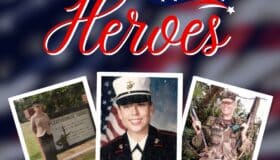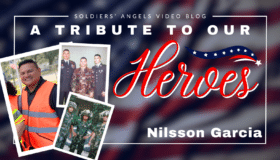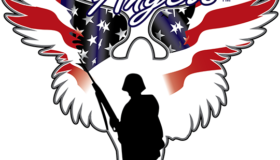A Tribute to Our Heroes: Korean War Veteran George Camacho
October 5, 2021
In this latest episode of our video series, “A Tribute to Our Heroes,” we talk with U.S. Navy Veteran George Camacho, who served on a transport carrier during the Korean War.
George shares about his experience and travels with the Navy, training to become a world record-holding weightlifter, and about accepting support through Soldiers’ Angels Mobile Food Distribution program when his family needed a helping hand.
View his video interview below.
Q. George you were attending a trade school and living in the Bronx when you joined the Navy? Why did you decide to sign up?
George: Being that my family comes from a military side – during the Second World War, we had five of our family join [to fight] in the Second World War. One got killed on the Normandy landing, one was in the Battle of the Bulge, one was in a tank division, one was a Merchant Marine, and the other was a foot soldier. I’m very proud of my family because of that… I joined the Navy, my brother joined the Air Force, my son joined the Submarine Service, my daughter joined the Army, and my son-in-law is a Marine, and I have another son-in-law who’s another Marine.
Q. So serving in the military is just part of your family DNA?
George: Right. I believe in my country. Like they say: don’t ask the country it can do for you. [Ask what you can] do for your country… I’m just proud of them.
Q. You worked on a transport carrier. Can you tell us a few stories about that?
George: Well, I got stationed in Japan, and we delivered the Corsairs [carrier-based aircrafts] into the harbor. The only time I saw anything was when I came out of the engine room and came up top to the flight deck to see some planes, and then I went back down to the engine room. That’s about the only war I saw. But, I mean, thank God I wasn’t shot.
Q. And you traveled around the world a few times?
George: We went twice around the world… I figured out we started in Norfolk and [by the time] I got discharged we hit 28 different places. And that’s a lot to see. Norfolk, Cuba, Panama, Brazil, Panama Canal, Philippines, Hong Kong, India, Suez Canal, Japan – I was stationed there – saw all of the Mediterranean. Then I got to see Spain, Portugal, Scotland, England, France, all of them! To keep up I gotta write them down.
But really, it was a big thrill. To see so much stuff, and it didn’t cost me anything but being loyal to the family and our country.
Q. Besides giving you the travel bug, how else did the military prepare you?
George: The military, for one, got me very orientated. And I pretty much lived my life that way. I try not to make stupid mistakes. I don’t drink. I don’t smoke. I don’t do drugs. I just get to stay married.
Q. And that clean living helped you pick up a new sport in your retirement?
George: I played on a Navy ship’s team, and whenever we dry docked, we’d get a chance to play [base]ball…When I got out of the Navy, I jumped into softball… When I was 68 years old I was playing a game and I tore a ligament, and I didn’t wait to heal it up and made it worse. I couldn’t run anymore. My wife told me to get another sport.
So I figured I’d go to the gym and just work out. There was a heavyweight world champ weightlifter who worked out in the same place. And he told me, “George, you’re a natural. Join the [International Weightlifting] Federation, and no one will ever beat you again.”
Over the next few years I got into a few competitions, and I won three or four competitions. I stopped at 79 – undefeated! I was a world champ in powerlifting. Squat, bench and deadlift… I was a world record holder, America’s record holder, and South Carolina’s record holder. I was happy. I accomplished something – becoming a world record holder at my age.
Q. You’re now living in San Antonio, and you’ve participated in Soldiers’ Angels Mobile Food Distribution program. How did you hear about that program?
George: My daughter heard about it and somehow she signed me up. And they called me up, and it really helped me out when I lost my house [in a fire]. I didn’t have very much of anything. That extra food they gave us carried us over quite a bit.
Q. Finally, what does it mean to you to be a Veteran?
George: Be honorable, really. It’s something that I’ve done that I didn’t have to do because I did it willingly, knowing the consequences. And I was glad I came back the way I came in. Being in the service is an honor.
From all of us here at Soldiers’ Angels, we want to thank George for his service to our nation.
Be sure to subscribe to our YouTube channel so you don’t miss any episode in our “A Tribute to our Heroes” video interview series.


